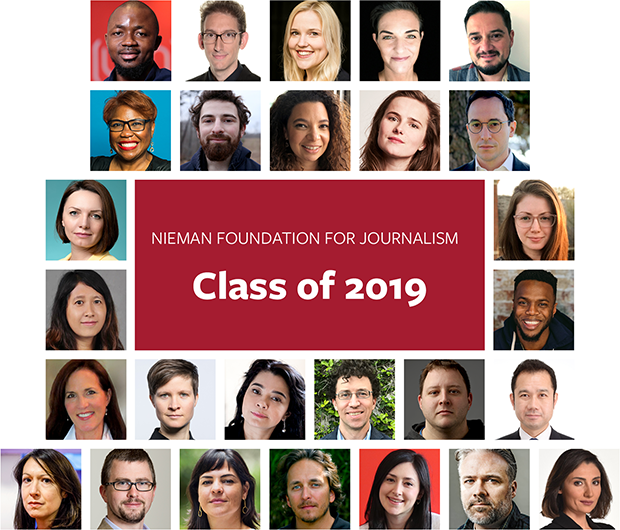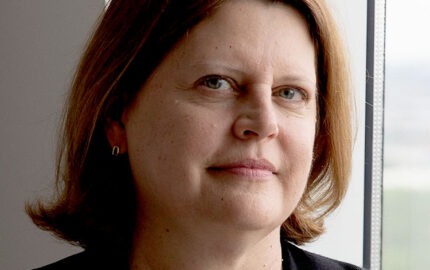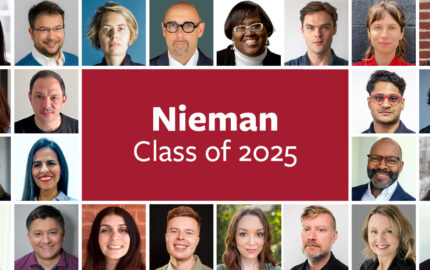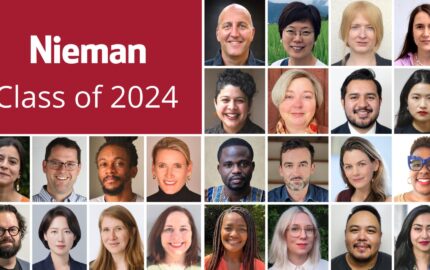The Nieman Foundation for Journalism at Harvard, home to internationally recognized journalism fellowships, programs and publications, has selected 27 Nieman Fellows for the class of 2019. The group includes reporters, correspondents, editors, photographers, filmmakers, television news anchors, a radio producer and other journalists who specialize in data investigations, digital development, social media, virtual reality and new forms of storytelling. They will begin two semesters of study at Harvard University in the fall of 2018.
Nieman additionally is hosting nine Knight Visiting Nieman Fellows for shorter periods throughout 2018 to work on research projects designed to advance journalism. They are supported by a grant from the John S. and James L. Knight Foundation.
The Nieman Foundation has educated more than 1,500 accomplished journalists from 97 countries since 1938. In addition to taking classes during their time at Harvard, fellows participate in Nieman seminars, workshops and master classes and conduct research with Harvard scholars and other leading thinkers in the Cambridge area.
New this year, Nieman will welcome three journalists chosen as the inaugural Abrams Nieman Fellows for Local Investigative Journalism. After two semesters at Harvard, they will receive funding for up to nine months of fieldwork at home, where they will work on a public service reporting project and participate in specialized journalism education. The fellowships are funded by a generous grant from the Abrams Foundation designed to strengthen local news coverage in underserved communities across the United States.
The 2019 Abrams Nieman Fellows are:
Together with Turkish Philanthropy Funds (TPF), the Nieman Foundation is also launching the Robert L. Long Nieman Fellowship, which honors the memory of journalist, filmmaker and news executive Robert L. Long. The fellowship was established by Long’s widow Joan Rebecca Siregar-Long and supports the work of exceptional Turkish journalists.
The other 2019 Nieman Fellows and their study plans:
Soji Akinlabi (Nigeria), lead producer and CEO of Africa Business Radio, will study the U.S. public media business model to learn how it might promote ethical journalism, transparency and accountability in reporting while contributing to the development of media entrepreneurship.
@soji_akinlabi
Shaul Amsterdamski (Israel), economics editor at Kan, Israel’s public broadcasting corporation, will study how public news organizations can use new technologies and forms of digital storytelling to deliver complex economic stories to a broad audience, with a focus on data journalism and crowdsourcing.
@amsterdamski2
Christina Andreasen (Denmark), the editor of digital development and social media at Berlingske, one of the oldest newspapers in the world, will study how legacy media can successfully turn digital by incorporating new skill sets in their newsrooms.
@AeChristina
Samantha Appleton, an American photographer who concentrates on historical trends, will examine the concept of otherness in the American psyche, from slavery to war, and how it affects the current century of news. The research will be used for future interdisciplinary projects rooted in photography.
@skappleton
Juan Arredondo (Colombia/USA), a documentary photographer, will study the impact photography can have on reconciliation in post-conflict societies and how visual storytelling can engage citizens in the aftermath of violence. As the 2019 Knight Latin American Nieman Fellow, his fellowship is supported by the John S. and James L. Knight Foundation.
@arrejuan
Tanya Ballard Brown, a digital editor for NPR, will focus on comedic journalism — the growing intersection of humor/satire and journalism — and how it can help journalists connect with their audiences and build community.
@TdoubleB
Anica Butler, an editor at The Boston Globe, will study change management and design thinking to learn how newsroom culture can become more nimble and dynamic. She will also explore how leadership can affect innovation and diversity
@AnicaButler
Mea Dols de Jong (Netherlands), an award-winning documentary filmmaker and journalist, will study the evolving rules for quality audiovisual journalism and storytelling on the internet.
@MeaDolsdeJong
Mattia Ferraresi (Italy), the U.S. correspondent for Il Foglio, will study the roots of American liberalism and its discontents, from the postwar consensus to the current era marked by the global resurgence of nationalistic and populist forces
@mattiaferraresi
Myroslava Gongadze, Voice of America’s Ukrainian service chief in Washington, D.C., will study propaganda in light of a new era of Russian information warfare against the West, and strategies to counter it
@MGongadze
Kaeti Hinck, an editor at The Washington Post, will investigate how neuroscience and psychology can inform the digital news ecosystem and reshape approaches to product design, visual journalism and trust.
@kaeti
Esther Htusan (Myanmar) a correspondent for The Associated Press, will study conflict, inequality and injustice and their impact on Myanmar and the surrounding region. She is the first Nieman Fellow from Myanmar.
@estherhtusan11
Jonathan Jackson, a co-founder of Blavity, Inc., will study the emergence of black media in the digital age, examining new ways to measure black cultural influence both inside the U.S. and abroad and its effects on the media and advertising landscape.
@Jon__Jackson
Mary Ellen Klas, the capital bureau chief for The Miami Herald in Tallahassee, Fla., will examine the relationship between declining journalism resources and corruption in local communities and more specifically, what happens to government integrity when watchdog reporting declines.
@MaryEllenKlas
Uli Köppen (Germany), head of data journalism at the German public broadcaster Bayerischer Rundfunk (ARD), will study how coding can improve journalism by enabling the investigation of algorithms and machine bias within interdisciplinary newsrooms.
@zehnzehen
Sevgil Musaieva (Ukraine), editor-in-chief of the online newspaper Ukrayinska Pravda, will study a range of media markets to determine the best tools and practices for fostering journalism that is independent of politics and business.
@SMusaieva
Steve Myers, editor of The Lens, a public-interest newsroom in New Orleans, will study how nonprofit, investigative news sites can reach civic-minded audiences, demonstrate their value and increase reader support.
@myersnews
Peter Nickeas, a reporter for the Chicago Tribune, will study the effects of trauma on children and use that understanding to inform editorial decisions and make violence coverage more accessible to readers.
@PeterNickeas
Yoshiaki Nohara (Japan), a Tokyo-based economics reporter for Bloomberg News, will research depopulation and its economic consequences in Japan as a case study for the trend in other nations.
@ynohara1
Francesca Panetta (United Kingdom), executive editor for virtual reality at The Guardian, will explore how experimentation and the adoption of emerging technologies in journalism can be more strategic.
@franpanetta
Brent Renaud, a filmmaker, photographer and journalist based in Little Rock, Ark., will study the effects of trauma and mental and emotional illness on rates of poverty and violence in America.
@RenaudBrothers
Gabriella Schwarz, managing editor of Flipboard in New York, will study how human editors and algorithms shape content. She will analyze how the rise of aggregators has changed the news and how that change is impacting the U.S and democracy.
@gabyaschwarz
Matthew Teague, an Alabama-based correspondent for National Geographic, The Guardian, The Atlantic and others, will study the emerging interdependence of faith and politics in the United States, and how journalists can best understand and cover it.
@MatthewTeague
In selecting the Nieman class of 2019, Nieman Foundation curator Ann Marie Lipinski, a 1990 Nieman Fellow, was joined by Kathleen Carroll, board chair of the Committee to Protect Journalists and the recent past executive editor and senior vice president of The Associated Press; Jerold S. Kayden, the Frank Backus Williams Professor of Urban Planning and Design at the Harvard University Graduate School of Design; Wendi C. Thomas, founder of MLK50: Justice Through Journalism, a Memphis-based news project, and a 2016 Nieman Fellow; and James Geary, Nieman’s deputy curator and a 2012 Nieman Fellow.
The Nieman Foundation for Journalism at Harvard educates leaders in journalism and elevates the standards of the profession through special programs that convene scholars and experts in all fields. In addition to its fellowship program, the foundation’s other initiatives include Nieman Reports, a website and quarterly print magazine that covers thought leadership in journalism; Nieman Lab, a website that reports on the future of news, innovation and best practices in the digital media age; and Nieman Storyboard, a website that showcases exceptional narrative journalism and explores the future of nonfiction storytelling.
Nieman additionally is hosting nine Knight Visiting Nieman Fellows for shorter periods throughout 2018 to work on research projects designed to advance journalism. They are supported by a grant from the John S. and James L. Knight Foundation.
The Nieman Foundation has educated more than 1,500 accomplished journalists from 97 countries since 1938. In addition to taking classes during their time at Harvard, fellows participate in Nieman seminars, workshops and master classes and conduct research with Harvard scholars and other leading thinkers in the Cambridge area.
New this year, Nieman will welcome three journalists chosen as the inaugural Abrams Nieman Fellows for Local Investigative Journalism. After two semesters at Harvard, they will receive funding for up to nine months of fieldwork at home, where they will work on a public service reporting project and participate in specialized journalism education. The fellowships are funded by a generous grant from the Abrams Foundation designed to strengthen local news coverage in underserved communities across the United States.
The 2019 Abrams Nieman Fellows are:
- Benny Becker, a public radio reporter for the Ohio Valley ReSource and WMMT/Appalshop, plans to research strategies for funding infrastructure in rural communities that are struggling with the collapse of an extractive economy. For his fieldwork, he will investigate these issues in multiple counties in eastern Kentucky and southern West Virginia.
@BHEBecker - Nathan Payne, executive editor of Michigan’s Traverse City Record-Eagle, will study the impact of data-driven investigative journalism on public perceptions of local media organizations. His fieldwork will examine the effects of mental health policies on local communities.
- Laura N. Pérez Sánchez, an investigative reporter and editor from Puerto Rico, will study corruption in post-disaster efforts, such as those following Hurricanes Katrina and Sandy, and how journalism can exercise better watchdog practices in reconstruction contexts. For her fieldwork, she will examine Puerto Rico’s ongoing reconstruction and use of relief funds after Hurricane Maria.
@LauraPerezS
Together with Turkish Philanthropy Funds (TPF), the Nieman Foundation is also launching the Robert L. Long Nieman Fellowship, which honors the memory of journalist, filmmaker and news executive Robert L. Long. The fellowship was established by Long’s widow Joan Rebecca Siregar-Long and supports the work of exceptional Turkish journalists.
- Afsin Yurdakul (Turkey), anchor and correspondent for the Habertürk News Network, has been selected as the first Robert L. Long Nieman Fellow. She will study the impact of the Syrian refugee crisis on Turkey and other host nations, focusing on what Turkey and others can do to support the long-term economic and social integration of refugees.
@afsinyurdakul
The other 2019 Nieman Fellows and their study plans:
Soji Akinlabi (Nigeria), lead producer and CEO of Africa Business Radio, will study the U.S. public media business model to learn how it might promote ethical journalism, transparency and accountability in reporting while contributing to the development of media entrepreneurship.
@soji_akinlabi
Shaul Amsterdamski (Israel), economics editor at Kan, Israel’s public broadcasting corporation, will study how public news organizations can use new technologies and forms of digital storytelling to deliver complex economic stories to a broad audience, with a focus on data journalism and crowdsourcing.
@amsterdamski2
Christina Andreasen (Denmark), the editor of digital development and social media at Berlingske, one of the oldest newspapers in the world, will study how legacy media can successfully turn digital by incorporating new skill sets in their newsrooms.
@AeChristina
Samantha Appleton, an American photographer who concentrates on historical trends, will examine the concept of otherness in the American psyche, from slavery to war, and how it affects the current century of news. The research will be used for future interdisciplinary projects rooted in photography.
@skappleton
Juan Arredondo (Colombia/USA), a documentary photographer, will study the impact photography can have on reconciliation in post-conflict societies and how visual storytelling can engage citizens in the aftermath of violence. As the 2019 Knight Latin American Nieman Fellow, his fellowship is supported by the John S. and James L. Knight Foundation.
@arrejuan
Tanya Ballard Brown, a digital editor for NPR, will focus on comedic journalism — the growing intersection of humor/satire and journalism — and how it can help journalists connect with their audiences and build community.
@TdoubleB
Anica Butler, an editor at The Boston Globe, will study change management and design thinking to learn how newsroom culture can become more nimble and dynamic. She will also explore how leadership can affect innovation and diversity
@AnicaButler
Mea Dols de Jong (Netherlands), an award-winning documentary filmmaker and journalist, will study the evolving rules for quality audiovisual journalism and storytelling on the internet.
@MeaDolsdeJong
Mattia Ferraresi (Italy), the U.S. correspondent for Il Foglio, will study the roots of American liberalism and its discontents, from the postwar consensus to the current era marked by the global resurgence of nationalistic and populist forces
@mattiaferraresi
Myroslava Gongadze, Voice of America’s Ukrainian service chief in Washington, D.C., will study propaganda in light of a new era of Russian information warfare against the West, and strategies to counter it
@MGongadze
Kaeti Hinck, an editor at The Washington Post, will investigate how neuroscience and psychology can inform the digital news ecosystem and reshape approaches to product design, visual journalism and trust.
@kaeti
Esther Htusan (Myanmar) a correspondent for The Associated Press, will study conflict, inequality and injustice and their impact on Myanmar and the surrounding region. She is the first Nieman Fellow from Myanmar.
@estherhtusan11
Jonathan Jackson, a co-founder of Blavity, Inc., will study the emergence of black media in the digital age, examining new ways to measure black cultural influence both inside the U.S. and abroad and its effects on the media and advertising landscape.
@Jon__Jackson
Mary Ellen Klas, the capital bureau chief for The Miami Herald in Tallahassee, Fla., will examine the relationship between declining journalism resources and corruption in local communities and more specifically, what happens to government integrity when watchdog reporting declines.
@MaryEllenKlas
Uli Köppen (Germany), head of data journalism at the German public broadcaster Bayerischer Rundfunk (ARD), will study how coding can improve journalism by enabling the investigation of algorithms and machine bias within interdisciplinary newsrooms.
@zehnzehen
Sevgil Musaieva (Ukraine), editor-in-chief of the online newspaper Ukrayinska Pravda, will study a range of media markets to determine the best tools and practices for fostering journalism that is independent of politics and business.
@SMusaieva
Steve Myers, editor of The Lens, a public-interest newsroom in New Orleans, will study how nonprofit, investigative news sites can reach civic-minded audiences, demonstrate their value and increase reader support.
@myersnews
Peter Nickeas, a reporter for the Chicago Tribune, will study the effects of trauma on children and use that understanding to inform editorial decisions and make violence coverage more accessible to readers.
@PeterNickeas
Yoshiaki Nohara (Japan), a Tokyo-based economics reporter for Bloomberg News, will research depopulation and its economic consequences in Japan as a case study for the trend in other nations.
@ynohara1
Francesca Panetta (United Kingdom), executive editor for virtual reality at The Guardian, will explore how experimentation and the adoption of emerging technologies in journalism can be more strategic.
@franpanetta
Brent Renaud, a filmmaker, photographer and journalist based in Little Rock, Ark., will study the effects of trauma and mental and emotional illness on rates of poverty and violence in America.
@RenaudBrothers
Gabriella Schwarz, managing editor of Flipboard in New York, will study how human editors and algorithms shape content. She will analyze how the rise of aggregators has changed the news and how that change is impacting the U.S and democracy.
@gabyaschwarz
Matthew Teague, an Alabama-based correspondent for National Geographic, The Guardian, The Atlantic and others, will study the emerging interdependence of faith and politics in the United States, and how journalists can best understand and cover it.
@MatthewTeague
In selecting the Nieman class of 2019, Nieman Foundation curator Ann Marie Lipinski, a 1990 Nieman Fellow, was joined by Kathleen Carroll, board chair of the Committee to Protect Journalists and the recent past executive editor and senior vice president of The Associated Press; Jerold S. Kayden, the Frank Backus Williams Professor of Urban Planning and Design at the Harvard University Graduate School of Design; Wendi C. Thomas, founder of MLK50: Justice Through Journalism, a Memphis-based news project, and a 2016 Nieman Fellow; and James Geary, Nieman’s deputy curator and a 2012 Nieman Fellow.
The Nieman Foundation for Journalism at Harvard educates leaders in journalism and elevates the standards of the profession through special programs that convene scholars and experts in all fields. In addition to its fellowship program, the foundation’s other initiatives include Nieman Reports, a website and quarterly print magazine that covers thought leadership in journalism; Nieman Lab, a website that reports on the future of news, innovation and best practices in the digital media age; and Nieman Storyboard, a website that showcases exceptional narrative journalism and explores the future of nonfiction storytelling.



